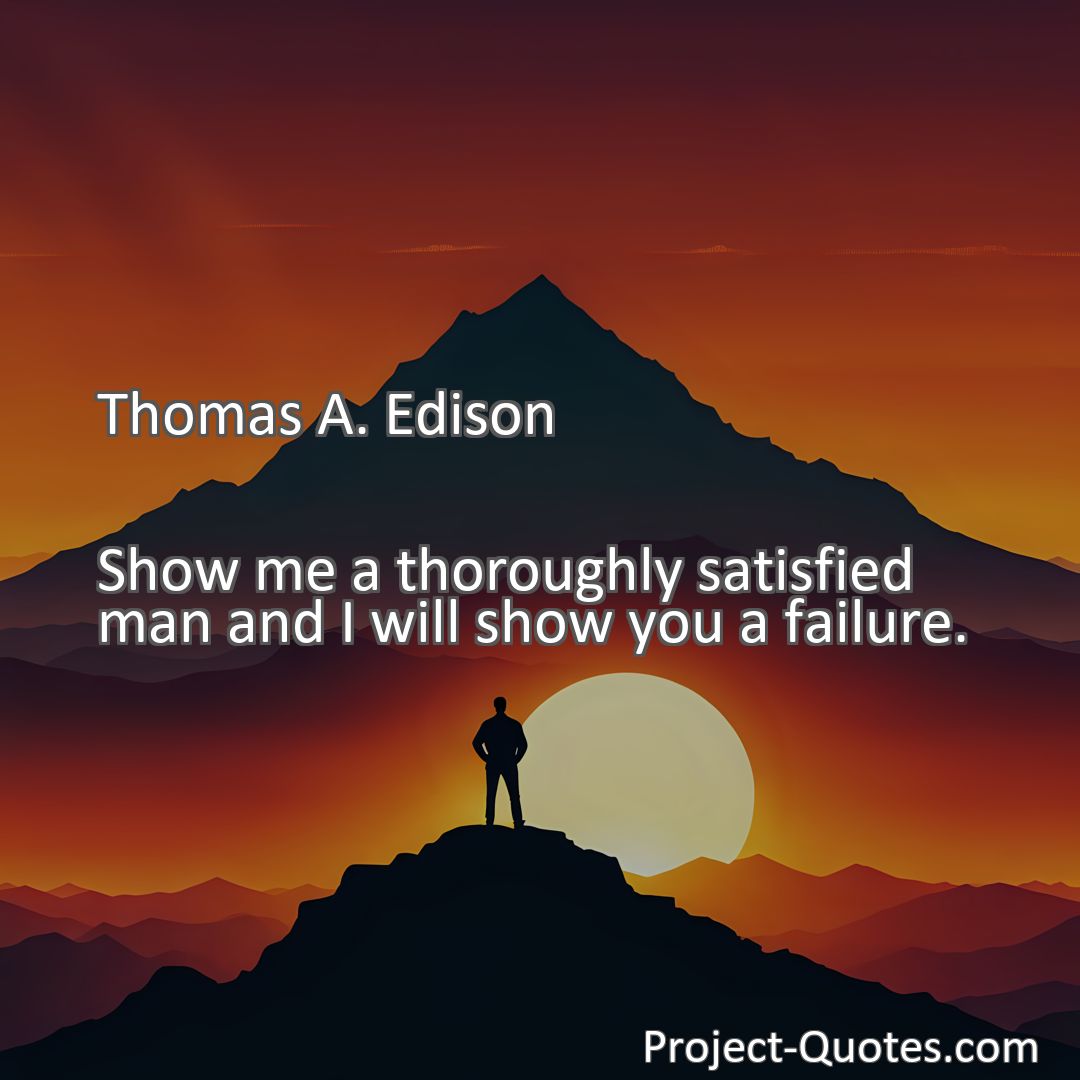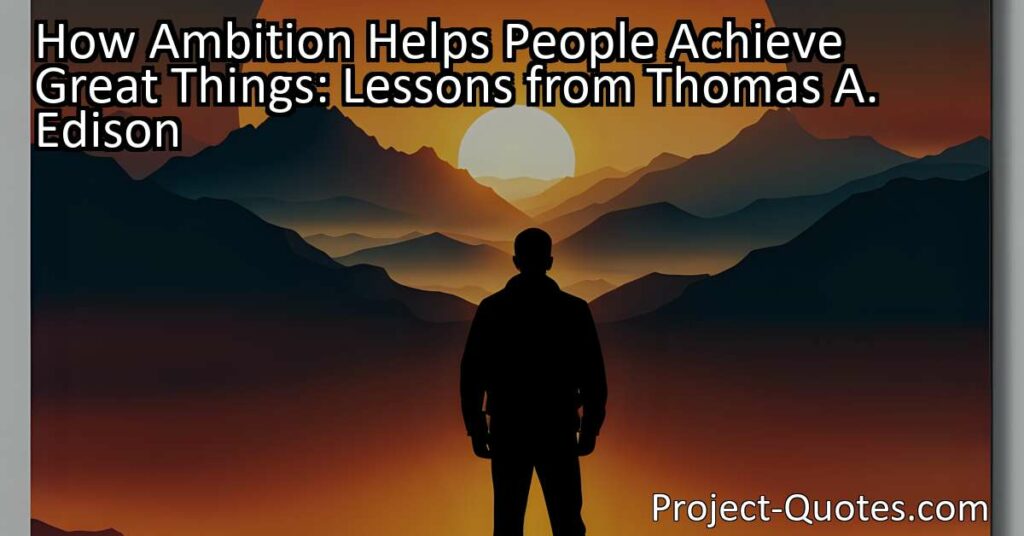Show me a thoroughly satisfied man and I will show you a failure.
Thomas A. Edison
How Ambition Helps People Achieve Great Things: Lessons from Thomas A. EdisonDiscover how Thomas A. Edison’s belief in never being thoroughly satisfied led him to achieve incredible inventions and patents. Learn the importance of challenging yourself, embracing curiosity, and never being complacent in order to achieve great things in your own life.
Table of Contents
Meaning of Quote – Show me a thoroughly satisfied man and I will show you a failure.
Oh hey there! Today, we’re going to dive into a thought that came from the mind of Thomas A. Edison. You know, the guy who invented the lightbulb? Yeah, that’s the one! He once said, “Show me a thoroughly satisfied man and I will show you a failure.” At first glance, this might seem a little harsh. I mean, isn’t being satisfied a good thing? Well, let’s unpack what good ol’ Thomas might’ve meant and see how it relates to our everyday lives.
When Edison talked about someone being “thoroughly satisfied,” he was hinting at the idea of being so comfortable with where you are that you stop wanting to grow, learn, and reach for new heights. It’s like if you decide that you’re the best soccer player in your neighborhood and stop practicing because you think there’s no room for improvement. In reality, though, there’s a whole world of soccer out there with players who are also kicking goals and getting better every day.
Imagine if Edison had been thoroughly satisfied after he invented one of his early inventions. Would he have gone on to create the lightbulb or any of the other 1,000+ patents he eventually held? Probably not! He kept pushing and learning because he wasn’t satisfied just standing still. He knew that even the smallest twinkles of an idea could burst into brilliant innovations if he worked hard enough.
Being unsatisfied isn’t about being unhappy or ungrateful, it’s about recognizing that there’s always something out there to reach for, something just beyond the edge of what we know. It’s like playing a video game; when you beat a level, you don’t just stop playing, right? You want to see what the next challenge is, meet new characters, and explore new worlds. That tickle of curiosity and ambition is what helps people achieve great things.
Now, let’s put that into the context of school. If you get a math problem right, and you’re satisfied, that’s great! But the real question is, can you do it again? Can you take that knowledge and use it to solve a harder problem? Real satisfaction comes from challenging yourself and learning from both the successes and the oops-didn’t-mean-to-do-thats.
Now, you might be thinking, “But wait, isn’t it okay to be happy with what I’ve achieved?” Absolutely! Celebrate those victories, big and small. Being pleased with your efforts is different from being thoroughly satisfied to the point of stopping. For instance, if you work really hard on a history project and get an A, it’s cool to be thrilled. But don’t stop there! Maybe you could help a friend with their project, or dive deeper into a part of history that really fascinates you.
The same goes with hobbies. Say you’ve just learned to play “Twinkle, Twinkle, Little Star” on the guitar. You rock that nursery rhyme like a superstar! But why stop there? There’s a whole universe of songs out there to be learned with chords and rhythms that will challenge and excite you.
This idea even pops up in friendships. Ever met someone new and thought, “Wow, we have a lot in common”? You could be satisfied with just that common ground, or you could dig deeper and learn more about each other’s differences and grow from that amazing friendship tapestry you’re weaving together.
Sure, this might sound like a lot of workand it is. But the cool part about striving for more is that it can actually be super fun. Ever heard someone say, “It’s about the journey, not the destination”? That’s what this is all about. Working towards a goal, learning new things, making mistakes and learning even morethat’s where the adventure is.
But what about failure? How does that tie into everything? Well, Edison definitely knew a thing or two about that. He didn’t invent the perfect lightbulb on his first tryor his second, or even his hundredth. He tried over and over, and each time he learned something that helped him get closer to his goal. To him, and many people who’ve done incredible things, failure wasn’t the end; it was just a step on the path to success.
So, how can you live out this idea? Start by setting a goal, something that gets you excited and feels a little out of reach. Once you’ve got that, break it down into smaller pieces, like levels in a game. As you tackle each one, remember to enjoy the process, laugh at the goofs, and celebrate the wins. And if you stumble? No sweat! It’s just another chance to learn.
In the end, having that mix of joy for what you’ve done and that itch to do more is what keeps the journey interesting. Life is sort of like a bicycle ride on a sunny day. You can cruise along, feeling the breeze, totally chill. But every now and then, you might spot a hill up ahead. You’ve got two choices: be satisfied with where you are, or pedal harder, feel your heart race, and see what sort of amazing view awaits you at the top.
To wrap this up, Edison’s idea is a call to all of us to be adventurers in our own lives, to be explorers of the possible, and to never be so satisfied that we forget the thrill of what’s just around the corner. Now, how about you? What’s something that you’re not thoroughly satisfied with yet? What’s that next hill you’re going to pedal up to see the view? Go chase it and let the journey be your biggest win!
I hope this quote inspired image brings you hope and peace. Share it with someone who needs it today!


